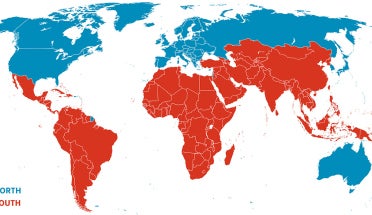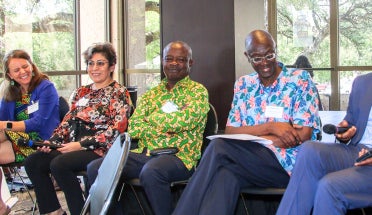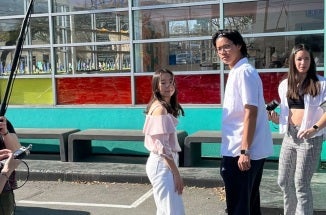
Students Produce Chinese TV Drama with Full Mandarin Script
- Apr 20, 2022
- by Kayla Johnson
Watching “Crazy Rich Asians” was the first time Katherine Zhang witnessed a major breakthrough in Hollywood representation. The 2018 film, the first to feature an all-Asian and Asian-American cast in 25 years, received critical acclaim and brought in more than $200 million at the box office worldwide.
As a first-generation Chinese American, Zhang rarely saw herself reflected in popular media growing up. But the success of “Crazy Rich Asians” seemed to reflect a growing interest in and acceptance of more diverse stories.
“People are becoming more open to watching people who don’t look like them,” says Zhang, a University of Texas at Austin junior studying advertising, Chinese, Asian studies, and liberal arts honors with a minor in business administration.
This burgeoning open-mindedness inspired her to use her creativity to promote greater Asian representation in media. Texas Student Television (TSTV) allowed her to do just that.
Texas Student Television is UT Austin’s student-run broadcasting station, the only one in the country to be FCC-licensed. Each year, TSTV hosts the Incubator Program, a class where selected students pitch, write and produce a pilot episode of an original TV series.
Through the program, Zhang is working with a team of three other students—Devin Jones, Sloanne Reardon and Liliana Esparza—to bring her idea to life by producing “Butterfly Knot,” the organization’s first Chinese drama with a script written entirely in Mandarin.
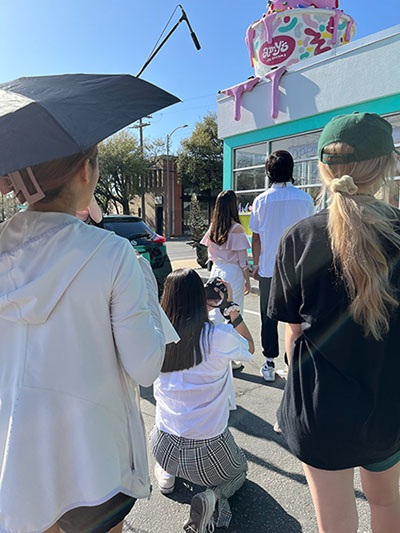
“Butterfly Knot” is a romantic comedy set in Austin, Texas. When a young man falls into a river, he is saved by a Chinese spirit of love, who, in turn for saving his life, requires him to serve as a spiritual matchmaker for four seasons. His first mission: to set up the girl he loves with someone else.
The show’s title took inspiration from literature Zhang read in her Classical Chinese course, including the writings of 4th-century Taoist philosopher Zhuangzi and legends of matchmaker god Yue Lao.
“The Butterfly Dream” is one of Zhuangzi’s most famous parables. In it, the philosopher dreams he is a butterfly fluttering around, consumed by perfect happiness. He inevitably awakens the next day in his own body, but the experience leaves him pondering whether he really has dreamed he was a butterfly, or if he is now a butterfly dreaming that he was once a man.
As a caterpillar undergoes a metamorphosis to become a beautiful butterfly, many of the “Butterfly Knot” characters change drastically as they explore their identities. Their fates are further guided by the Chinese god of love and marriage, Yue Lao, who connects soulmates by tying together red, silken strings.
Crafting an Authentic Voice
2021 was a difficult year for Zhang after one of her friends passed away. He was part of her close-knit high school group that was more like chosen family for her. Through this group, she learned the value of unconditional platonic love. Deeply moved by these friendships, she wants “Butterfly Knot” to represent types of love less commonly shown onscreen.
The show’s protagonist, Kai, is in love with the female lead, named Luna. When they meet up to hang out one day, Kai is sure it’s their first date. He excitedly confesses his feelings to Luna but is surprised to discover she likes women. To her, this is just a study session.
Kai struggles to understand why she isn’t attracted to him since he’s a nice guy, good-looking and well-off. Even more shocking, he finds out his first mission as Yue Lao’s apprentice is to set up Luna with her true love interest, Penny.
While his first instinct is to try to sabotage the mission, Kai eventually comes to terms with the fact that he must respect others’ preferences and not tamper with love. Beyond learning how to deal with unrequited feelings and not to view all women as romantic conquests, he also grows into his masculinity.
“It’s about him being allowed to feel and learning to love himself rather than try to love someone else or make someone else love him, as well,” says collaborator Devin Jones, a junior radio, television and film (RTF) major.
As the assistant director of “Butterfly Knot,” Jones is mainly responsible for producing, scheduling and scriptwriting. The only man on the team, he says he sees a lot of his younger self in Kai, especially when it comes to facing rejection and learning to be comfortable in your skin.
Lessons like these may resonate with young viewers navigating dating, building friendships, and setting boundaries for the first time in college. And in a world where men are often discouraged from or made to feel ashamed of expressing their emotions, Jones says he hopes Kai can be a positive role model.
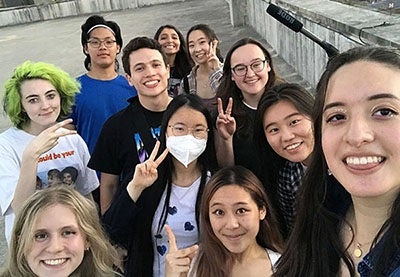
Jones says the team has been careful and intentional about representing Chinese culture in a way that is authentic rather than gimmicky. That is part of the reason the show is fully scripted in Mandarin.
The crew took precedence from the film “Crouching Tiger, Hidden Dragon” for their scriptwriting process. First, each team member wrote their own version of the script in English. Then they combined the strongest ideas, and Zhang and her friend Grace Song translated everything into Mandarin.
Working collaboratively illuminated for everyone how art could be a universal language but also a difficult task that left room for things to be potentially lost in translation. Jones says the process has taught him to trust in others people’s visions.
“Their voice can differ from yours, but it also adds more depth to the script,” Jones says. “An authentic voice in the writing room can change how a script is told and how authentic the character is.”
Forwarding the Future of Representation
There has been a surge in the popularity of East Asian media over the past decade, especially Korean and Chinese dramas and anime. The Korean show “Squid Game” caught global attention last year, receiving almost 1.7 billion views in the first month after its premiere.
“Butterfly Knot” cinematographer and editor, Liliana Esparza, has been an anime fan her whole life. The freshman RTF major says she’s excited that people are finally enjoying content she loves, but also disappointed that media from other countries is still often looked down upon.
“I remember when watching anime or listening to K-pop made you a loser,” Esparza says. “Once something is Americanized suddenly, it’s okay, and I think that signals to the larger racist views we have about other cultures."
Esparza says working on a fully Mandarin show where she doesn’t always understand everything and isn’t in control has been challenging but rewarding. Not only has she learned about a new culture, but she says the Incubator Program helped her make new friends and gain valuable hands-on experience.
“There are things that most people don’t learn until they’re out in the field and they have to stumble through,” Esparza says. “I know all the steps in the production process because I’ve been through it, and we’ve struggled through it.”
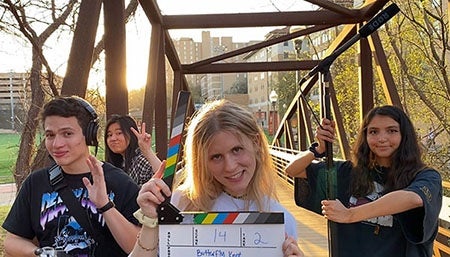
The crew is currently in post-production, editing their final cut of the pilot episode ahead of the Incubator Program’s screening in May. They plan to produce several seasons of the show in the future.
Katherine Zhang says she hopes that even after the team graduates, “Butterfly Knot” will continue to create a safe space for students, especially Chinese and other international students, to be creative and have their voices heard.
“If there’s something you’ve been wanting to do for a long time, just go out and do it,” Zhang advises. “You’d be surprised by the reality you could create for yourself and others.”

